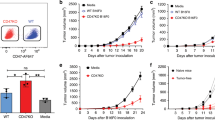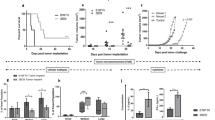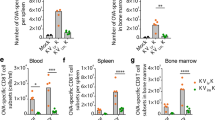Abstract
We have demonstrated previously that gene transfer of the mature human interleukin-1β (IL-1β) gene, fused to a signal sequence (ss), into mouse B16 melanoma cells results in an inhibition of their growth in vivo compared with control B16 cells. We here extend these results to show that intraperitoneal vaccinations with irradiated IL-1β-secreting cells result in protection against subsequent subcutaneous challenge with wild-type (wt) B16 tumor cells in syngeneic C57BL/6 mice. This protection appears to be long-lasting, because rechallenge of cured mice 4 months after the first challenge also demonstrated resistance. In addition, we demonstrate that mice with established wt tumors subjected to therapeutic vaccinations with irradiated B16/ssIL-1β cells starting 3 days after challenge isografting have a significantly inhibited tumor growth and 25–40% survival at the challenge doses given. In vitro coculture of spleen cells from B16/ssIL-1β vaccinated animals and wt B16 cells induced an enhanced proliferative response, which correlated with elevated production of IL-2 and interferon-γ. A significantly enhanced cytolytic activity against B16 wt target tumor cells was observed when spleen cells from B16/ssIL-1β vaccinated mice were used as effector cells compared with spleen cells from control vaccinated mice. In vitro depletion experiments using anti-asialo GM1 revealed a prominent role for natural killer cells as effector cells. The data suggest that local IL-1β secretion during the vaccination phase can provoke or augment protective immune responses to B16 melanoma cells, which are otherwise not recorded in mice bearing B16 tumors.
This is a preview of subscription content, access via your institution
Access options
Subscribe to this journal
Receive 12 print issues and online access
$259.00 per year
only $21.58 per issue
Buy this article
- Purchase on Springer Link
- Instant access to full article PDF
Prices may be subject to local taxes which are calculated during checkout
Similar content being viewed by others
Author information
Authors and Affiliations
Corresponding author
Rights and permissions
About this article
Cite this article
Björkdahl, O., Dohlsten, M. & Sjögren, HO. Vaccination with B16 melanoma cells expressing a secreted form of interleukin-1β induces tumor growth inhibition and an enhanced immunity against the wild-type B16 tumor. Cancer Gene Ther 7, 1365–1374 (2000). https://doi.org/10.1038/sj.cgt.7700248
Received:
Accepted:
Published:
Issue Date:
DOI: https://doi.org/10.1038/sj.cgt.7700248



